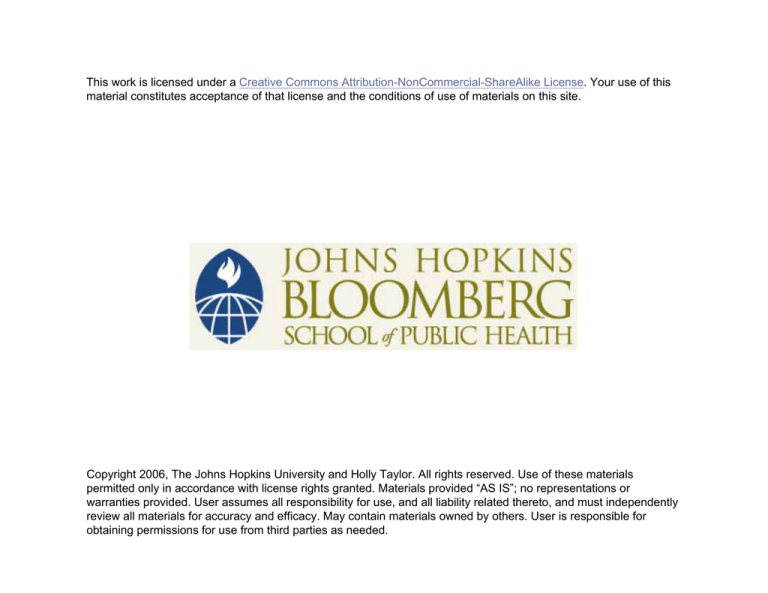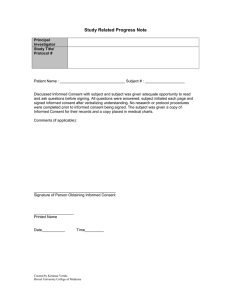
This work is licensed under a Creative Commons Attribution-NonCommercial-ShareAlike License. Your use of this
material constitutes acceptance of that license and the conditions of use of materials on this site.
Copyright 2006, The Johns Hopkins University and Holly Taylor. All rights reserved. Use of these materials
permitted only in accordance with license rights granted. Materials provided “AS IS”; no representations or
warranties provided. User assumes all responsibility for use, and all liability related thereto, and must independently
review all materials for accuracy and efficacy. May contain materials owned by others. User is responsible for
obtaining permissions for use from third parties as needed.
Protection and Access
Holly Taylor, MPH, PhD
Johns Hopkins University
Section A
Themes and Definitions
Themes
Protection and Access
Protection from . . .
– Harm
– Exploitation
Access to . . .
– Potential benefits
– Beneficial interventions
Continued
4
Themes
Justice considerations relevant at every stage
of a research project
– Choosing a research question
– Study design
– Locale of study
– Recruitment of subjects
– Dissemination of results
5
Framework for Ethical Analysis
Justice
Moral requirement
– Equals should be treated equally
Practical applications
– Fair procedures for selection of study
subjects (individual, social)
– Gender/minority equity
6
Paradigms of Justice
General definition
– Equals must be treated equally and
unequals must be treated unequally
Continued
7
Paradigms of Justice
Procedural justice
– Well-ordered
– Agreement
– Just procedures vs. just outcomes
Continued
8
Paradigms of Justice
Oppression as a concern of justice
– Power and political standing
– Unfair distribution
– Compensatory justice
• Redress past wrongs
Continued
9
Paradigms of Justice
Distributive justice
– How should we allocate a given resource?
– Applies to classes/groups
– Who ought to receive the benefits and
bear the burdens of research
participation?
Continued
10
Paradigms of Justice
Distributive justice
– Historical perspective of Belmont
• Burdens fell on one group
• Benefits accrued to another
Continued
11
Paradigms of Justice
Belmont Report
Subject selection
– Individual level
– Social level
Patterns of injustice
12
CFR: Criteria for IRB Approval
In order to approve research covered in this policy the
IRB shall determine that all of the following
requirements are satisfied:
– Selection of subjects is equitable. In making this
assessment the IRB should take into account the
purposes of the research and the setting in which
the research will be conducted and should be
particularly cognizant of the special problems of
research involving vulnerable populations, such as
children, prisoners, pregnant women, mentally
disabled persons, or economically or educationally
disadvantaged persons.
Source: 45 CFR 46.111
Continued
13
CFR: Criteria for IRB Approval
In order to approve research covered in this policy, the
IRB shall determine that all of the following
requirements are satisfied:
– When some or all of the subjects are likely to be
vulnerable to coercion or undue influence, such as
children, prisoners, pregnant women, mentally
disabled persons, or economically or educationally
disadvantaged persons, additional safeguards have
been included in the study to protect the rights and
welfare of these subjects.
Source: 45 CFR 46.111
14
Section B
Vulnerable Populations
Definition of Vulnerable
Someone incapable of providing informed
consent, or . . .
– Obvious
– Determined
If capable of providing informed consent,
may not be in position to give voluntary
consent
16
Conditions for Enrollment
Subject may personally benefit from the
research, or . . .
The research is directly related to the specific
conditions of the class involved
– Alzheimer’s disease study
17
Vulnerable Populations
According to 45 CFR 46
– Pregnant women/neonates/fetuses
– Prisoners
– Children
Continued
18
Vulnerable Populations
Pregnant women/neonates/fetuses
– Subpart B (1978, 2001)
19
Definition of Vulnerable
Someone incapable of providing informed
consent, or . . .
If capable of providing informed consent,
may not be in position to give voluntary
consent
20
Fetus
Purpose to meet health needs of fetus
Risks minimized or minimal
Consent from both parents
21
Pregnant Woman
Purpose to meet health needs of mother
Risks to fetus minimized or minimal
Consent from both parents
Continued
22
Pregnant Woman
No inducements
No overlap between researchers and
termination of pregnancy
Researchers have no role in determining
viability of fetus
23
Definition of Vulnerable
Someone incapable of providing informed
consent, or . . .
If capable of providing informed consent,
may not be in position to give voluntary
consent
24
Pregnant Woman
Influence of hormones
Fetus has no voice
Risk of harm
Continued
25
Pregnant Woman
Clinton revisions
– Presumption of inclusion
– Consent of father no longer required
Continued
26
Pregnant Woman
Bush revisions
– Addition of neonates
– Consent of father required when research
directed at fetus alone
27
Prisoners
Limits on voluntary consent
Exposed to risk of enrollment
Continued
28
Prisoners
Subpart C (1978)
Permitted research
– On topic related to interaction with system
and no more than minimal risk/
inconvenience
– On prisons or prisoners as group and more
than minimal risk/inconvenience
Continued
29
Prisoners
Permitted research
– On conditions affecting prisoners as class
– On practices with intent of improving
health/well-being
Continued
30
Prisoners
Additional safeguards
– Limits on rewards for participation
– Risks similar to what non-prisoners would
accept
– Selection fair
– Information understandable
– No role in parole
– Adequate follow-up
31
Definition of Vulnerable
Someone incapable of providing informed
consent, or . . .
If capable of providing informed consent,
may not be in a position to give voluntary
consent
32
Competence
Mentally infirm
– Decision-making ability
• Incapacity
• Developmental disability
• Dementia
– Surrogate decision-maker
Continued
33
Competence
Unconscious (e.g. patient in ER)
Educationally disadvantaged
– Illiterate
34
Voluntariness
Impoverished
Military
Dependent relationship
35
Competence and Voluntariness
Terminally ill
Resident of resource poor country
36
Vulnerability
Cognitive/communicative
Institutional
Deferential
Source: NBAC (2001). Ethical and Policy Issues in Research
Involving Human Subjects
Continued
37
Vulnerability
Medical
Economic
Social
Source: NBAC (2001). Ethical and Policy Issues in Research
Involving Human Subjects
38
History of Abuses
- Nazi prisoner experiments
- Jewish chronic disease hospital
- Tuskegee
- Willowbrook
PROTECTION
-From harm
-From exploitation
ACCESS
-To benefit
-To outcome
Section C
Exclusion of Women from Clinical
Research
History of Exclusion
Food and drug acts—1906, 1938
Thalidomide—1960s
Continued
41
History of Exclusion
Food and drug act amendment—1962
DES—1960s
FDA regulations—1977
Continued
42
History of Exclusion
“A woman of childbearing potential is defined
as a pre-menopausal female capable of
becoming pregnant. This includes women on
oral, injectable, or mechanical contraception,
women who are single, women whose
husbands have been vasectomized, or whose
husbands have received or are utilizing
mechanical contraceptive devices.”
Source: Food and Drug Administration (1977)
43
Potential Harm to Offspring
- Thalidomide/DES
FDA Regulations
Study Design Considerations
Oppression
PROTECTION
-From harm
-From exploitation
ACCESS
-To benefit
-To outcome
Harms of Exclusion
No share of potential benefits
Lack of data to inform medical practice
– Heart disease
– HIV/AIDS
Continued
45
Harms of Exclusion
Adverse effects burden
Lack of treatment options
46
Demands for Inclusion
- Harms of exclusion
- Drug trials = health care
- Congressional interest
PROTECTION
-From harm
-From exploitation
ACCESS
-To benefit
-To outcome
Inclusion of Women
Shift to inclusion and access
– AIDS activism
– Evidence about level of risk
– Congressional interest
Continued
48
Demands for Inclusion
- Harms of exclusion
- Drug trials = health care
- Congressional interest
PROTECTION
-From harm
-From exploitation
ACCESS
-To benefit
-To outcome
Inclusion of Women
Shift to inclusion and access
– U.S. PHS Task Force—1985
– NIH Policy—1986
– FDA Guidelines—1988
– GAO Report—1990
Continued
50
Inclusion of Women
Shift to inclusion and access
– ORWH created—1990
– NIH policy—1990
– WHI initiated—1991
– GAO report—1992
Continued
51
Inclusion of Women
Current policy
– FDA revision—1993
– NIH guidelines—1994
– FDA regulation—1998
– FDA regulation—2000
Continued
52
Inclusion of Women
GAO report on NIH—2000
NIH response—2001
GAO report on FDA—2001
AHRQ report—2003
53
Inclusion of Minorities
Causes for concern?
– Perpetuates racism
– Race is a marker for social conditions
• Why spend time looking for biologic
differences
– Sample size inflation
– Threats to voluntariness
54
Who should be
exposed to risk?
study
population
population
Who gets share
of potential benefit?
study
population
population
To whom do the
results apply?
International Trials
- Short course AZT
Domestic Trials
-Gene therapy (Gelsinger)
-Healthy volunteer (Roche)
PROTECTION
-From harm
-From exploitation
International Trials
- Short course AZT
ACCESS
-To benefit
-To outcome
Where is study
being conducted?
study
population
Who will have
access to successful
intervention?
population





